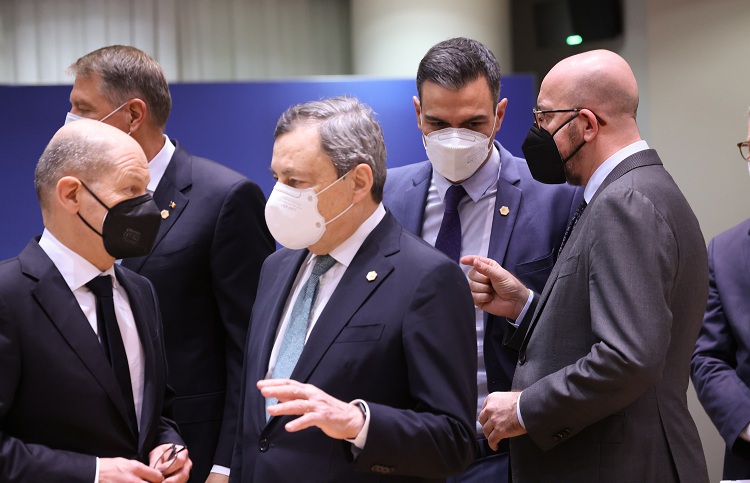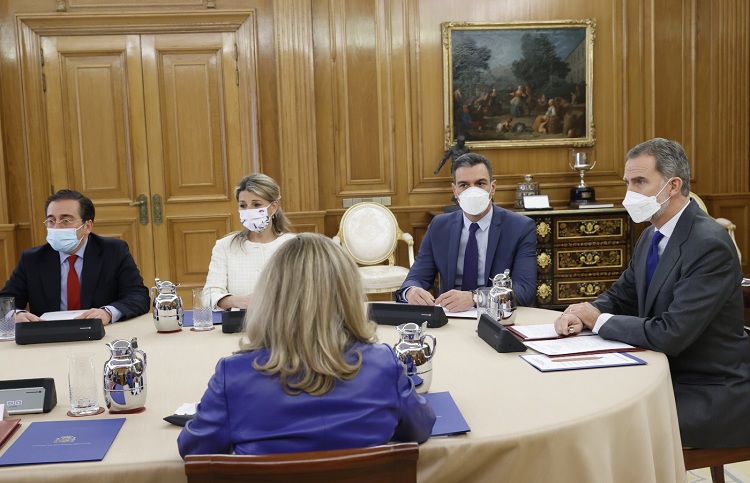The Diplomat
The heads of state and government of the European Union, including the head of the Spanish Executive, Pedro Sánchez, yesterday approved the new package of sanctions against Russia in response to the invasion of Ukraine by Vladimir Putin’s regime.
The President of the European Council, Charles Michel, urgently convened this extraordinary meeting of the European Council to address “the situation in Ukraine following Russia’s unprovoked and unjustified military actions, which seriously violate international law and undermine European and global security and stability”.
The new sanctions, drawn up by the European Commission, “cover the financial sector, the energy and transport sectors, dual-use goods, export control and financing, and visa policy,” according to the text of conclusions adopted by the European Council. It also extends the blacklist of individual sanctions to include oligarchs close to Putin and persons involved in the military operation. In addition, the Heads of State and Government of the European Union asked the European Commission to prepare contingency plans in the field of energy in view of the possible impact of the sanctions on the European economy.
However, this package of sanctions does not exhaust all the measures envisaged by the EU, which could reserve new actions pending what may happen. For the time being, strong measures on energy supply, an issue that generated great divisions in the EU, or on the expulsion of Russia from the SWIFT banking telecommunications system, which facilitates financial transactions, have been ruled out. This measure had been requested by the Baltic countries and Belgium.
As previously reported by the President of the European Commission, Ursula von der Layen, the aim of these sanctions is to have a “harsh impact” on the Russian economy and contribute to dragging down its growth, increasing inflation and eroding its industrial base. To this end, the new package of sanctions – in addition to those approved earlier this week – includes visa and transport restrictions, economic and trade and financial restrictions to “kill Russia’s growth, increase its financing costs, raise inflation and intensify capital outflows” and measures to prevent access to key technologies, such as high value-added components or software, “from which the elite derive much of their profits,” Von der Layen said.
At the press conference following the summit, Von der Leyen herself specified that the new round of sanctions includes blocking 70 percent of the banking system and Russian state-owned companies to the capital market and will prevent the transfer of technology to refine oil, which will affect a sector that earned 24 billion in exports in 2019. The operations of certain Russian airlines and visas for Russian businessmen and politicians are also blocked.
The EU began to activate its response yesterday as soon as information from Ukraine began to arrive. In the morning, EU heads of state and government adopted a joint declaration in which they condemned “in the strongest terms the unprecedented military aggression Russia has carried out against Ukraine.” “By its unprovoked and unjustified military actions, Russia is seriously violating international law and undermining European and global security and stability,” the statement continued.
Subsequently, EU High Representative for Foreign and Security Policy Josep Borrell stated that “these are Europe’s darkest hours since World War II.” “The EU will respond as firmly as possible and agree the toughest sanctions package we have ever applied,” he added.
For his part, Charles Michel said during the joint press conference with Ursula von der Leyen and NATO Secretary General Jens Stoltenberg that “this unprovoked and unjustified attack is unlike anything that has happened on European soil since the end of World War II.” “It is an attack on the free and sovereign state of Ukraine and its territorial integrity, a flagrant violation of international law, replacing the rule of law with brutality,” as well as “an attack on peace and security in Europe” and thus “on the foundations of our European Union.”
Likewise, the President of the European Parliament, Roberta Metsola, declared before meeting with the leaders participating in the extraordinary summit, that the Russian offensive was “a direct attack on the heart of the model of democratic society, which Putin wants to divide because he fears this model”.







